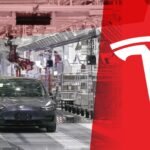
Tesla builds its own battery cells. But they are lagging far behind expectations. That is why Elon Musk is said to have given his team an ultimatum. If the existing problems are not solved soon, the project will probably be abandoned.
Tesla introduced its in-house battery cell 4680 to the world for the first time in 2020. At the time, Elon Musk and his company had high hopes for the cylindrical battery unit with a diameter of 46 millimeters and a height of 80 millimeters. Compared to previous Tesla cells, it was supposed to have six times as much “power” and five times the capacity, as well as guaranteeing 16 percent more range with the same space utilization.
Four years later and Musk’s patience seems to be running out, as The Information (via Electrek). Tesla had only celebrated the production of 1000 cells per day at the end of 2022. However, the project has also had to contend with a number of problems and setbacks throughout its history.
The batteries were originally supposed to be produced in the Gigafactory Grünheide. However, after delays, technical difficulties arose with the dry coating of the electrodes. In addition, the cells have not yet achieved the expected performance and are not as cost-effective as planned.
Musk is said to have given his team an ultimatum: reduce costs and improve “one of the most important innovations” in batteries by the end of the year. What exactly this means is not clear.
In addition, according to a person familiar with the project, there is currently a tricky technical problem with the 4680 batteries, which means that the battery cells can implode during use. If these problems are not solved in time, Musk will not invest any more in the development of the technology.
The goal of producing its own cars more independently and, above all, more cost-effectively using self-made battery cells seems to be a distant prospect for Tesla for the time being. It will be exciting to see whether the company’s engineers will find a solution to the problems of the 4680 batteries by the end of the year.